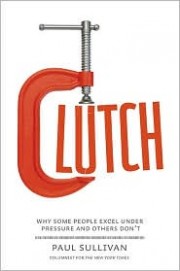Thought Leaders Unpacked -> Clutch #4: Being Present
 “Being present” is a term of great personal interest.
“Being present” is a term of great personal interest.
Of all my professional traits and skills, the one I would describe as both my greatest strength and my favorite is my capacity to “be present.”
For purposes of our discussion of Sullivan’s Clutch we need to be careful, because he uses the word slightly differently than you are used to hearing from me.
 Sullivan uses the theatre and stage acting to illustrate the characteristics of “being present.” When you are “on” you need to fully embody the character you portray. When you are “off” you are able to switch back and be yourself.
Sullivan uses the theatre and stage acting to illustrate the characteristics of “being present.” When you are “on” you need to fully embody the character you portray. When you are “off” you are able to switch back and be yourself.
Being present means the experience of each is an all-or-nothing affair. You are not thinking about acting, how you want to come across, your facial expressions, or the intensity of your voice. You simply become the character.
It’s the self-consciousness that undermines the ability to be fully present in the role. It’s the extra thinking about what others are thinking, whether or not you’re effective, and what adjustments you might need to make that pulls you out of the role and sabotages your full engagement.
As we translate the acting illustration into our own pressure-filled, time sensitive, clutch moments that require our being fully present, the key question to us is, are we trying to engage the situation in our head more than with our choices? Can we get out of our heads and into the rest of our bodies? Are we having the confrontation or thinking about how it is progressing? Are we making the decision or trying to appear decisive?
When arguing with a subordinate at work are you listening to what they have to say and responding to those issues, or are you thinking of a way to reestablish your authority because they are not showing you respect?
When giving a presentation to top management are you concerned with communicating the facts clearly, or are you concerned with coming across as competent and articulate?
I have (and I believe most people have) a sixth sense for smelling out people who are not completely present. We know when we are not being listened to, being told spin instead of the truth, or being given a pep talk instead of a helping hand.
The key here is not to question whether others on the team are “being present” but to question whether you yourself are being present.
The benefit of being present is primarily for yourself. The real you engaged with real people around a real issue. It doesn’t get any better. You have control over how you show up and little to no control over everyone else.
What is most difficult about being truly present for you? What was your main-take away from this chapter?






